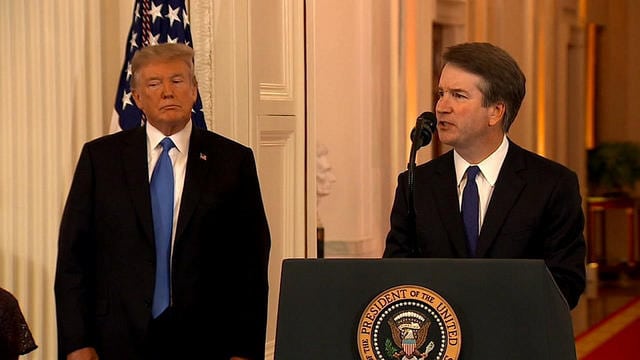Unless something extraordinary happens, Chairman Chuck Grassley will gavel to order the Senate Judiciary hearings on Judge Brett Kavanaugh’s nomination to the Supreme Court next Tuesday. Weather forecasters are predicting a high temperature that’s 15 degrees above average for the Washington DC area. Political forecasters will be watching to see how Judge Kavanaugh weathers the heat of his confirmation hearing.
Nomination hearings are on opportunity for the Senate to shine a light on a nominees’ views and fitness for the position they would fill. In this case, only a portion of Judge Kavanaugh’s records from his service in the government are available for the Judiciary Committee to review before the hearing. Because of this, all ten Democrats on the Senate Environment and Public Works Committee have said hearings should not go forward until the public release of documents pertaining to any work Kavanaugh may have done on environmental issues during his years as a senior White House aide.
The public is being poorly served by the Republican rush to hearings. These hearings should not begin until the Senate, and the public, can review the emails, memos and other correspondence Kavanaugh produced while at the White House. Those documents can provide unique and essential insights into Kavanaugh’s work as a public servant accountable to the American people.
Just ask Judge Kavanaugh.
“People sometimes ask what prior legal experience has been most useful for me as a judge,” Kavanaugh said in a 2015 speech at Marquette University. “And I say, ‘I certainly draw on all of them,’ but I also say that my five-and-a-half years at the White House, and especially my three years as staff secretary for President George W. Bush, were the most interesting and formative to me.”
There is a record of that formative and instructive period. Without reviewing that record, the Senate cannot fulfill its Constitutional duty to render a full and fair assessment of Kavanaugh’s fitness to serve a lifetime appointment to the highest court in the land.
The next Supreme Court justice will likely cast the deciding vote on a host of rulings that determine how well we protect the environment and public health. On an array of legal questions that will shape the kind of world we leave to our children, the court in general, and the next justice, in particular, could well get the last word.
At NRDC, we don’t oppose Supreme Court nominees lightly. We haven’t done so in 13 years. In Kavanaugh’s case, we must make an exception, because he would be exceptionally bad for our environment and health.
After reviewing his record during the 12 years he’s served as a federal judge on the U.S. Court of Appeals for the District of Columbia Circuit, we find four major patterns of concern:
- favoring industry over the public;
- limiting public access to the courts;
- undercutting the authority of agencies to do their job; and
- weakening enforcement of environmental law.
Our laws enshrine our values. They lay out our responsibilities to each other and to society at large in a way meant to advance the pursuit of equity and justice at the heart of our national aspirations. And they set boundaries that protect our rights, property, welfare and health—as individuals, and as a nation.
Our laws, though, mean nothing unless they’re faithfully interpreted and fairly enforced. The buck stops with the Supreme Court, with the decisions its justices hand down.
Today, the laws we all depend on to protect the environment and public health are under assault like never before from some of the biggest and wealthiest industrial polluters in history and their political enablers in the White House and on Capitol Hill. Our next Supreme Court justice must be someone who will uphold the values, responsibilities and boundaries enshrined in our laws. Unfortunately, Brett Kavanaugh is not that justice.
Our next Supreme Court justice could still be on the bench when today’s young adults approach retirement. That justice must be someone who’s devoted to enforcing the laws that protect their world from the mounting threat of environmental ruin. Our children deserve that much from us, and we should expect no less.
Ana Unruh Cohen is managing director of government affairs at NRDC and the NRDC Action Fund.

